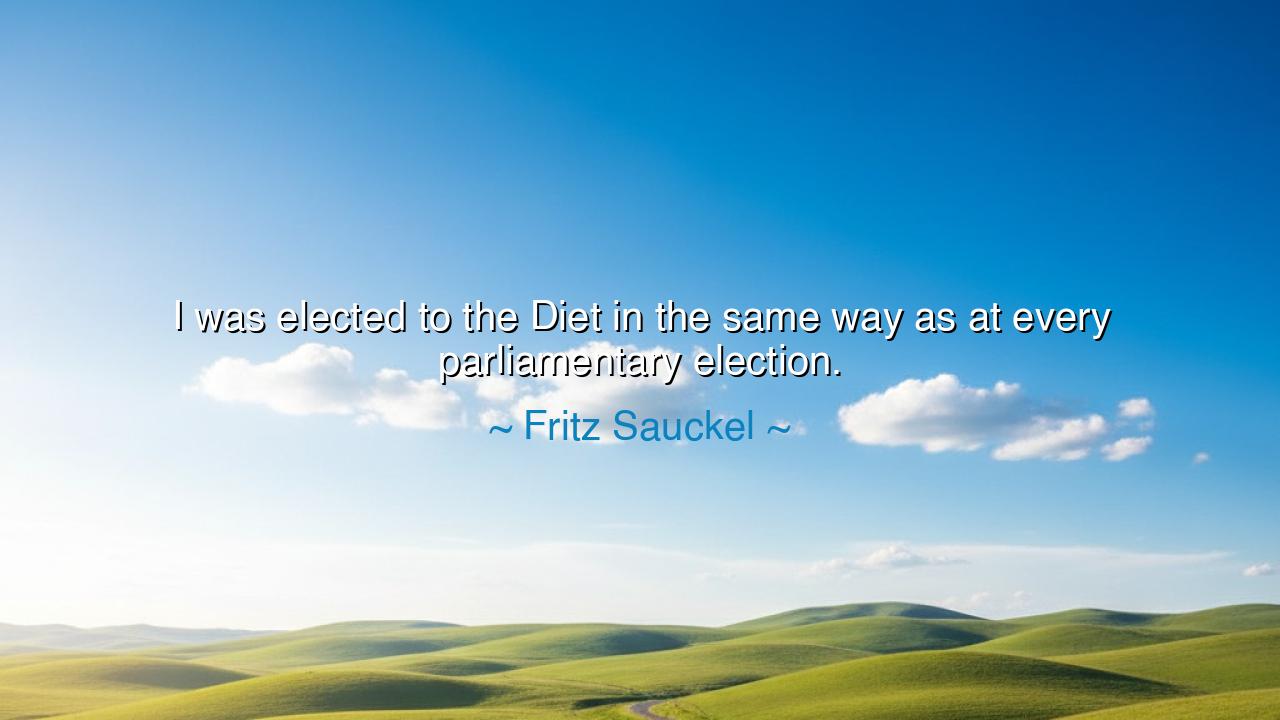
I was elected to the Diet in the same way as at every






"I was elected to the Diet in the same way as at every parliamentary election." These words, spoken by Fritz Sauckel, hold within them both the simplicity of an official declaration and the weight of the political realities of his time. At first glance, this statement may seem humble, even unremarkable. But upon deeper reflection, it unveils the profound dynamics of power, influence, and the intersection of individual choice and collective fate. In this declaration, Sauckel reveals more than the mere method of his election; he touches upon the fragility of democracy and the forces that shape the very systems we live by. It is a reminder that elections, whether in ancient or modern times, are never purely a reflection of the will of the people, but are often shaped by the unseen forces that lie behind the political veil.
In the days of ancient Greece, the concept of democracy was born in the city-state of Athens, where citizens gathered to vote on matters of state. The system, though imperfect, was revolutionary in its emphasis on individual participation and collective decision-making. But the Greeks, especially Socrates, understood that democracy was not merely a system of elections; it was a delicate balance between freedom and responsibility. To be elected was not simply a matter of popular will, but of being chosen to carry the weight of the public trust. In the same way, Sauckel’s statement speaks to the broader tension within any system of governance: that those elected are often products of a system that is both flawed and powerful, shaped by forces beyond the simple will of the people.
The idea of being elected "in the same way as at every parliamentary election" implies a certain predictability—an established pattern of participation within a larger system. It suggests that elections, while they may appear to be acts of individual choice, often follow a predetermined script. This was true in Sauckel’s time, as well as in the ancient world. The Roman Senate, for instance, operated under a complex system of patronage and influence, where power was often secured not through public choice, but through the calculated alliances of those in control. The patricians of ancient Rome understood that democracy was not always as straightforward as a vote cast by the people; it was, more often than not, a contest of wills, where the truly influential played a role that was hidden from the public eye.
Consider the story of Julius Caesar, whose rise to power in Rome was marked by not just his popular support, but by the political maneuvering behind the scenes. Though Caesar was elected to the highest offices of the Roman Republic, his ascension was not the result of a simple electoral process; it was a reflection of his strategic alliances, his understanding of public sentiment, and his ability to sway the political elite. In much the same way, Sauckel’s election, though seemingly straightforward, would have been shaped by the forces of political influence, ideology, and the overarching structures of power in Germany during the early 20th century. To be elected, then, was not just an act of individual merit, but the result of a much larger machine that moved according to forces often invisible to the public eye.
In this light, Sauckel’s statement serves as a poignant reminder of the complexity of elections and the often hidden realities of political power. It teaches us that democracy, as we understand it, is not always a perfect system of representation, but a fragile construct, shaped by circumstance, manipulation, and the collective will of a society. Just as the ancient Greeks and Romans struggled with the limitations of their democratic systems, we too must be cautious in our faith in the purity of electoral processes. The lesson here is not to despair, but to be vigilant, to understand that power and influence often lie in the hands of those who can navigate the systems that govern us, regardless of the appearance of fairness.
But this awareness should not lead us to cynicism or inaction. Instead, it calls us to engage more deeply with the systems that govern our lives. If we are to safeguard the integrity of democracy, we must recognize its inherent flaws and seek to correct them. As Plato once warned in The Republic, the danger of democracy is that it can be easily corrupted by those who understand how to manipulate the system for their own ends. And yet, he also believed that the power of the people—the will of the masses—could overcome this corruption, provided that the citizens remained engaged and informed.
Thus, the lesson that Sauckel’s words offer us is one of awareness and action. Elections, like any other system of governance, are shaped by forces that may be hidden from the public eye. It is up to us to seek the truth, to understand the mechanics of the systems that govern us, and to act with wisdom and integrity. Whether we are voters, leaders, or citizens, the power to shape our world lies not only in the act of voting but in the conscious engagement with the systems that govern us. As we strive toward a more just and transparent world, let us remember that democracy, like any other noble pursuit, requires our constant vigilance and active participation.






AAdministratorAdministrator
Welcome, honored guests. Please leave a comment, we will respond soon